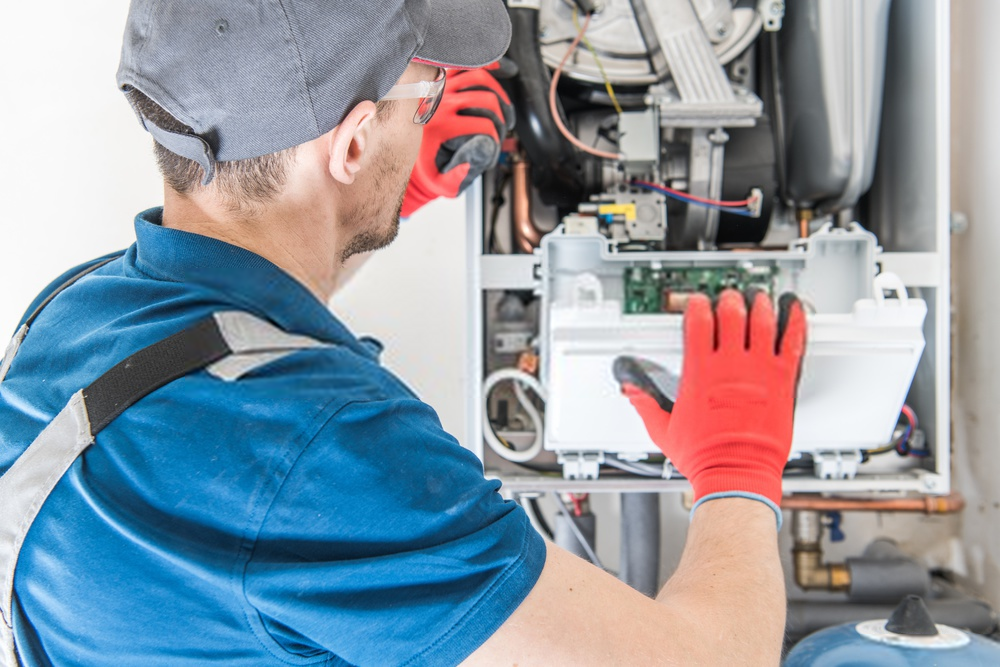Choosing the Right Furnace or Heating System

One of the most crucial systems that help to improve home comfort is the furnace, but an air conditioner is also vital. Installing a furnace is a major investment, so it is imperative you conduct some research before you decide to install a particular type of furnace. Obviously, there are several important factors that should be considered before choosing a furnace.
Types of Furnaces
There are two common types of space heating systems. These are boiler/radiant systems and forced air systems. The latter requires a network of air ducts around the building while the former needs plumbing, for distributing hot water or steam, and radiators/baseboards.
Furnace Install and Buying Guide
In this article, we are not looking at boilers or AC units, only furnaces. There are also solar panel systems and geothermal heating systems. However, we’ll only look at furnaces, which include oil, gas, and electric furnaces. 
Electric Furnaces
This is the perfect option if you live in an area with mild winter weather. Electric furnaces have the advantage of being the most affordable to install. However, they also have high running costs due to the high unit costs of electricity. However, these furnaces can still be used cost-effectively in areas where winter temperatures are usually well above freezing. Electric furnaces have a life expectancy of 15-20 years.
Gas Furnaces
Gas furnaces are the most common types of furnaces. While they may have higher upfront costs than electric furnaces, they have lower running costs. They are incredibly efficient and can quickly heat up your home on demand, but, they require the installation of air ducts. In addition, frequent maintenance is needed, and this can increase running costs.
Oil Furnaces
These are the oldest heaters known to mankind. While they may not be as popular as they used to be, they still exist in some buildings. They are the perfect option for people living in areas that experience extreme or harsh winter weather. Oil heating systems require a fuel tank to store fuel oil. This means extra space is required. The tanks also need to be cleaned regularly to remove sediment.
What to Look for in a Furnace
The most important factor to consider when looking for a furnace to install in your home is the energy source, as noted above. The following is a list of other factors to take into consideration.
BTU Rating
It is important you choose a furnace that can comfortably meet the heating needs of your home. The general rule of thumb is to apportion 30-60 BTUs for each square foot of space in your home. If your home is exactly 2500 sq ft, therefore, you will need a furnace with a BTU rating of 75,000 to 150,000.
AFUE Rating
Just because you’ve gotten the BTU rating right doesn’t mean that the furnace will be able to heat your home comfortably. You also need to get the AFUE rating right. AFUE is an acronym for Annual Fuel Utilization Efficiency. It is simply a measure of how energy-efficient the furnace is at converting fuel to heat in the course of the year. AFUE rating is important when comparing fuel sources and furnace models.
If a gas furnace has an AFUE rating of 80%, this means that the appliance converts 80% of gas burned in the furnace to heat. The remaining 20% of gas consumed is lost. Therefore, a gas furnace with a BTU rating of 100,000 and an AFUE rating of 80% is only able to deliver 80,000 BTUs to your home. As you can see, this is an important fact that you need to know when ordering a furnace. 
Please note that the AFUE rating does not take into consideration heat losses in the air ducts or piping. These losses can account for nearly 35% of the energy output of the furnace. Things can even be worse if the air ducts passing through the attic and garage are poorly insulated.
Load Calculation for Proper Installation and Maintenance
Before a furnace can be installed, the load calculation must be done. This is crucial because you want to know the amount of heat your home needs while taking into consideration the type of window you have, location of your home, foundation type, insulation, and house size, among other factors. Only qualified HVAC contractors can carry out an accurate load calculation. The importance of load calculation is that it can prevent you from buying an oversized or undersized furnace.
Warranty
A key benefit of having a new furnace installed is that it comes with a warranty, which covers manufacturer defects and most repairs. Most warranties usually range from 5 to 10 years. You may have to pay an extra fee to get an extended warranty or lifetime warranty.
It is also crucial you look for the best place to install the furnace. The ideal spot should have enough space for ventilation. Be sure to also seal and insulate your home properly to ensure you do not lose any heat.
The following are important factors to consider when selecting a furnace. While they may not be as important as the factors listed above, they are worth looking at. They are:
Ignition System: By avoiding a pilot light system that burns continuously, you can significantly improve the efficiency of the system
Air Filtration: If a furnace has an integrated filtration system, you will have less dust circulating in the system.
Variable-Speed Blower: This helps to deliver air in a quieter, slower, and more controlled manner, thereby helping to prevent temperature swings.
Variable Heat Output: This feature is available on furnaces with variable speed blowers, and it’s known for boosting efficiency and comfort.
Dual Heat Exchanger: This ensures there’s maximum efficiency by extracting heat from burning gasses.
Zoned Heating: It makes it possible for you to heat certain parts of the house and leave out rooms that are not currently in use, thereby helping you save energy.
Average Furnace Costs: The cost of installation will depend on a variety of factors, so you need to look at all the costs associated with installing the furnace and related ductwork.
